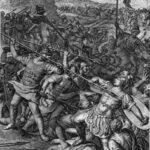From Shemot 1:15 to 2:22, the children of Israel are referred to exclusively as ‘Hebrews’ (עבריים\עבריות). The term is used occasionally in the Tanakh, particularly in Shemot and Sefer Shmuel. The first incident of it being used is in Bereishit 14:13 where Avraham is referred to as ‘Avram the Hebrew’ when learning that Lot has been kidnapped by the four Kings who made war on Sodom. There are two possible etymologies for the term. The first is that it refers to the descendants of Ever (עבר), the great grandson of Shem and the sixth-generation ancestor of Avraham. This is based on Bereishit 10:21, where Shem is identified as ‘the father of all the sons of Ever’, that is, presumably, the Hebrews. The second is that it is based on the verb ‘to cross’ (ע ב ר) and refers to people who have crossed from one place to another, that is a foreign or migrant people. This may be based on the fact that Avraham crossed over the river Euphrates from his homeland to Canaan, or that the children of Israel crossed the boundary into Egypt and then subsequently to Canaan.
As a rule, the term is used when the verse is narrating from the perspective of those who view the Israelites as a foreign people, either the natives of Canaan in the time of Avraham, the Egyptians, or the Philistines. The term ‘children of Israel’, by contrast, is used when speaking from the perspective of the Israelites or that of God. This might indicate that the term Hebrew is an ethnic identifier, as opposed to a religious one, similar to the term Semite (that is, descendant of Shem) in modern English. When speaking to Pharaoh, Moshe sometimes calls HASHEM the ‘the God of the Hebrews’, thereby identifying Him as the national God of a particular people, as opposed to identifying the children of Israel by their worship of a particular God (YisraEL). This perspective may be that of Onkelos, who translate the term as יהודאי, ‘Jews’, a national, rather than religious term. Like the term Semite, it may be that ‘Hebrew could be used both to refer specifically to the children of Israel and also to a wider racial or linguistic group of which they were a part. Sforno and Ibn Ezra, however, take the opposite approach, arguing that ‘Hebrew’ denotes those who followed the religious perspective of Ever, that is those who believed in one God.
For more on parshat Shemot, see Haggadah Berurah, the Haggadah that helps you tell the story of yetziat mitzrayim.



Leave a Reply